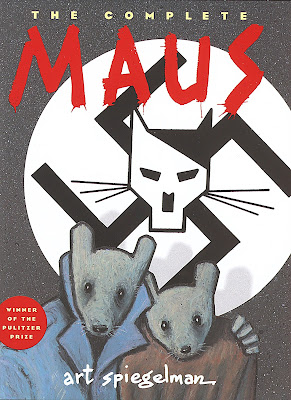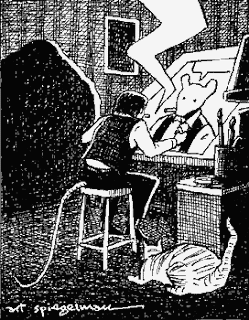"Maus" by Art Spiegelman
Growing up, I read through countless books in which the main characters were cute, anthropomorphic animals. They would teach me to read, to be kind, and many other elementary things. I will see them going through their adventures in the jungle, or the forest, or even in cities! However, I never thought I would ever be reading about mice going through the Holocaust. The most shocking thing of it all? Is that this is actually pretty genius storytelling.
Though the use of animals as characters may seem juvenile, this story is far from that. That exact factor is what makes the book so compelling. The story of the author’s parents and their survival from the Holocaust is heart-wrenchingly intriguing from beginning to end. From his dad getting drafted just before the Nazi invasion to his emotional reunion with his wife after leaving the concentration camps. Spiegelman does not back away from giving the harsh sides of survival during the war. How tough it was for anyone to live during those times.
As he has admitted before in interviews, Spiegelman says this was a way for him to understand and connect with his parents. As their second child who was born after the war was over, and as someone who never got to meet his older brother, this was a way to connect and understand them through the retelling of their lives. This is one of many of my favorite elements in the narrative. The fact that this is not your regular memoir story, but also a glimpse through history that is way more touching than what any textbook could tell you. This is the artistic vision of someone who’s telling their father’s life story in order to put it out there into the world. To make sure no one ever forgets about what millions of innocent people went through during the Holocaust. But it’s also very valuable because, through the making of the book, the author found a way to amend his differences with his father.
I admire how open and honest the author is of their dysfunctional father and son relationship. How he doesn’t glamorize him and will not back down from moments in which Vladek does something questionable. He tells it like it is. It’s not structured to lie to the reader. It’s meant to be a message. To tell the story of Vladek but also to put him under a more realistic light, a perspective that shows he’s not all that good either (as proven by his distance to Artie and an interesting encounter with an African-American hitchhiker).
It’s something that I, at least, found very eye-opening. I can definitely relate to the coldness between my parents and their distance whenever it comes to talking about their past. “Maus” really helped at making me understand how the trauma people deal with after such occurrences does not end right then and there. It is something that carries on with you for the rest of your life. It’s for sure made me be more considerate of my mother, specifically. As someone who migrated to this country with her ten years ago, I always wanted to ask her what life was like for her back in our homeland of Venezuela. Before she had me, before everything got corrupted in our country. But there’s a reason why she doesn’t speak of those things. There’s a reason she’s kept it to herself and moved forward. It’s stories like these that leave an imprint on me and I’m grateful for the vulnerability of memoirs like “Maus”.
“Maus” is a great example of how one can tackle any topics when it comes to the graphic novel format. It is through life stories like Vladek’s and Artie’s that I began to love graphic novels even more. It is a format or writing that allows you to extend in any story of your choosing, and it does not limit you on what to say and how long to illustrate for. It’s fascinating the many things you can do with this format and I’ve begun to appreciate it more the more I find out about real-life stories like this. It’s so commemorable how, through the hardships of his father’s distancing and his mother’s suicide, Spiegelman still went on to tell their stories.
Though the use of animals as characters may seem juvenile, this story is far from that. That exact factor is what makes the book so compelling. The story of the author’s parents and their survival from the Holocaust is heart-wrenchingly intriguing from beginning to end. From his dad getting drafted just before the Nazi invasion to his emotional reunion with his wife after leaving the concentration camps. Spiegelman does not back away from giving the harsh sides of survival during the war. How tough it was for anyone to live during those times.
As he has admitted before in interviews, Spiegelman says this was a way for him to understand and connect with his parents. As their second child who was born after the war was over, and as someone who never got to meet his older brother, this was a way to connect and understand them through the retelling of their lives. This is one of many of my favorite elements in the narrative. The fact that this is not your regular memoir story, but also a glimpse through history that is way more touching than what any textbook could tell you. This is the artistic vision of someone who’s telling their father’s life story in order to put it out there into the world. To make sure no one ever forgets about what millions of innocent people went through during the Holocaust. But it’s also very valuable because, through the making of the book, the author found a way to amend his differences with his father.
I admire how open and honest the author is of their dysfunctional father and son relationship. How he doesn’t glamorize him and will not back down from moments in which Vladek does something questionable. He tells it like it is. It’s not structured to lie to the reader. It’s meant to be a message. To tell the story of Vladek but also to put him under a more realistic light, a perspective that shows he’s not all that good either (as proven by his distance to Artie and an interesting encounter with an African-American hitchhiker).
It’s something that I, at least, found very eye-opening. I can definitely relate to the coldness between my parents and their distance whenever it comes to talking about their past. “Maus” really helped at making me understand how the trauma people deal with after such occurrences does not end right then and there. It is something that carries on with you for the rest of your life. It’s for sure made me be more considerate of my mother, specifically. As someone who migrated to this country with her ten years ago, I always wanted to ask her what life was like for her back in our homeland of Venezuela. Before she had me, before everything got corrupted in our country. But there’s a reason why she doesn’t speak of those things. There’s a reason she’s kept it to herself and moved forward. It’s stories like these that leave an imprint on me and I’m grateful for the vulnerability of memoirs like “Maus”.
“Maus” is a great example of how one can tackle any topics when it comes to the graphic novel format. It is through life stories like Vladek’s and Artie’s that I began to love graphic novels even more. It is a format or writing that allows you to extend in any story of your choosing, and it does not limit you on what to say and how long to illustrate for. It’s fascinating the many things you can do with this format and I’ve begun to appreciate it more the more I find out about real-life stories like this. It’s so commemorable how, through the hardships of his father’s distancing and his mother’s suicide, Spiegelman still went on to tell their stories.
It was through speaking the hardships of the truth that he was able to tell his family’s story and was also able to make graphic novels serious. As Maus went on to become the first to ever win a Pulitzer Prize.
Who would’ve thought, right? Not Spiegelman at the time. That’s for sure!
One can say Spiegelman was a visionary of his time. Someone who has inspired others to create
their own memoirs. Coming from someone who’s slowly becoming a graphic novelist herself,
I must say I’m very grateful for artists like Art Spiegelman.
their own memoirs. Coming from someone who’s slowly becoming a graphic novelist herself,
I must say I’m very grateful for artists like Art Spiegelman.




Comments
Post a Comment